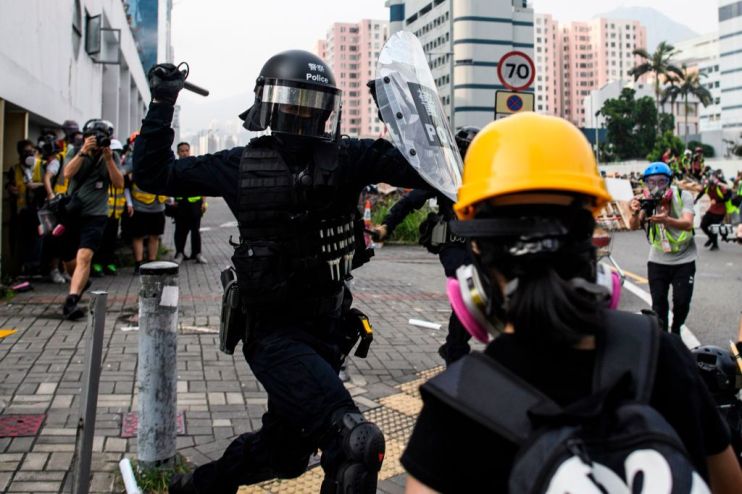Petrol bombs and water cannon: Hong Kong protesters clash with police

Police and protesters clashed again in Hong Kong over the weekend, exchanging tear gas and water cannon for petrol bombs and bricks, as the city continues to face a major crisis.
Pro-democracy demonstrations continued in the city yesterday, as protesters congregated around the Chinese army’s outpost in Hong Kong.
Read more: As protests raged, China ‘rejected’ Hong Kong leader Carrie Lam’s plan to appease citizens
Police fired several rounds of tear gas towards the crowds, who took shelter behind umbrellas. They answered the fire with bricks thrown in the police’s direction.
Protests have reportedly died down on Sunday, with only a few hundred people left on the scene. However yesterday’s violence forced shops and restaurants to close in many popular areas.
“We have to keep protesting, we cannot let China take back Hong Kong now,” Evelyn, 25, an asset manager, told Reuters. She was part of a group chanting “gangster” at local police.
She is among many young people who are afraid of Chinese control over the island, which has in the past maintained elements of independence.
“I absolutely cannot live under Chinese rule,” she said, adding she could leave Hong Kong if protesters’ demands were not met.
But the government has criticised protesters for their role as the city teeters on the brink of recession. “The behaviours of the radical protesters gravely breach the public peace and pose a serious threat to the safety of police officers on duty and members of the public at the scene,” it said.
Riot police marching through part of the city were pelted with petrol bombs from flyovers. Unconfirmed reports said that one off-duty police officer was wounded.
Read more: Hong Kong protests: Joshua Wong and Agnes Chow charged as China clamps down
Meanwhile, the police used water cannon filled with blue dye so they could easily identify the protesters.
The protests started three months ago in response to a bill which would have allowed extraditions to mainland China. But once the bill was delayed, the movement turned into an outright pro-democracy protest.